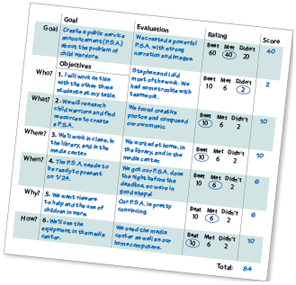Web Page: What Is a "Good" Inquiry Question?
Writing to Inquire
Besides deepening your understanding of a topic, writing can assist at each stage of the inquiry process.
Questioning
Questions create voids that will be filled with answers. The following chart explains the types of questions you will write and answer during the inquiry process.

| Are the noble gases inert? |
| For whom is the element flerovium named? |
| Why is element 116 called livermorium? |
| What assumptions are we making about naming elements? |
| How could we adapt element names to make them more memorable? |
| What would you name the next element? |
| If you had to eliminate one element, which would it be? |
| How can energy condense to form matter? |
| Could a living thing be made of pure energy? |
Your Turn Choose a topic you are currently studying. Write one example for each type of question above about the topic. Find answers to four or more of your questions.
Planning
Writing also serves well during the planning phase of inquiry. The planning sheet on page 361 directs you to write a goal and objectives (answering the five W’s and H questions about a project) and to reflect on tasks, time, team, and tools.
Your Turn Set a goal in one of your classes. Then answer the 5 W’s and H about the goal to come up with objectives. See the planning sheet on page 361 for an example. (Download a template.)
Researching and Creating
The researching and creating stages of inquiry often involve various types of writing:
- Taking notes (resource information, details, interviews)
- Reporting information (essays, articles, stories)
- Communicating with others (text messages, invoices, subpoenas)
- Recording data (weather data sheets, double-elimination tournaments, medical charts)
Your Turn Think about the different ways you use writing throughout your day. When do you use it to report information, to communicate with others, to record data, to take notes? In what other ways do you use writing?

Improving
Writing is a key evaluation tool. For example, the rubric on page 417 offers space to assess how well the goal and objectives of a particular project have been met. Written evaluations can tell you what works and what doesn’t, so you can make improvements.
Your Turn Using the goal and objectives you created on page 184 , create a rubric (download a template). Keep it on hand to track your progress with your goal.
Presenting
Writing often plays a role as you prepare to present your finished work. For example, you may need to make posters, write articles, print tickets and labels, design signs, compose captions, and so on.
